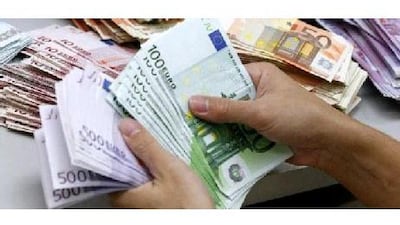While other major economies, particularly China, Japan and the US, keep their currencies low, the euro rises, and exports from the EU become costlier and less sellable Berlin // History shows that everyone eventually loses when nations try to gain competitive advantage by devaluing their currencies. It will be no different if the "currency war" raging among the world's major economies, especially between the US and China, continues. But Europe looks set to be the first victim because the single currency has been caught in the crossfire.
Since the end of June, the euro has appreciated 14 per cent against the dollar, 12 per cent against the Chinese yuan and 4.2 per cent against the Japanese yen. If the US eases monetary policy further, as is widely expected, if China continues to refuse to allow its currency to rise much against the dollar, and if the Bank of Japan goes on selling yen, the euro will keep appreciating sharply, making European exports to the rest of the world more expensive and putting the bloc's recovery at risk.
It is not just bad news for European exporters such as Airbus, for which every appreciation of 10 US cents by the euro means €1 billion (Dh5.13bn) less operating profit. The ailing Greek economy, highly dependent on tourism, stands to lose desperately needed holiday trade to nearby countries outside the euro zone, such as Turkey and Egypt. At present, Europe is paying a price for global economic imbalances. It is a measure of how dramatically world markets are out of kilter that Ireland's mounting deficit woes have not stalled the euro's rise. Just a few months ago, when all eyes were on the continent's debt problems, the news that Ireland's credit rating was being downgraded and that it faced a €50bn bill to restructure its banks would have sent investors fleeing the euro in a panic.
This time they hardly batted an eyelid, even though it is clear that the continent is still struggling to cope with the debt left over from the global financial crisis of 2008 and last year. There have been mass demonstrations across Europe against austerity measures, and the European Central Bank (ECB) is still trying to stabilise debt markets by purchasing sovereign bonds issued by troubled member states.
There is little that euro-zone policymakers can do about the exchange rate dilemma. The ECB's next interest rate move is bound to be up rather than down, to keep inflation in check in the current recovery. And Europe will not follow the US example of threatening to impose punitive tariffs on Chinese imports. The heavyweight Germany, which owes its current boom largely to soaring exports of cars and machinery to China, would block any such move for fear of inciting a trade war.
Currency intervention to push down the euro is not on the cards either. The ECB has always been fundamentally sceptical of the merit of trying to steer the exchange rate by buying or selling euros. Besides, intervention works best when co-ordinated among the world's top central banks. And as the major economies cannot agree on what the exchange rates should be, prospects for co-ordinated intervention are close to zero.
It is true that China has been keeping its exchange rate artificially low to boost economic growth. That is an age-old recipe for an emerging economy to speed up its development. China knows that a rapid appreciation of its currency could make it suffer the same fate as Japan, which in the 1980s succumbed to US pressure to let the yen appreciate against the dollar. That led to a slump in exports, followed by interest rate cuts that in turn created a speculative bubble in the stock and property markets. Japan has not recovered since. But it is encouraging that China has signalled it will allow the yuan to appreciate gradually.
The US is the bigger source of imbalance because it has amassed astronomical debts by living above its means for decades, secure in the knowledge that it will always find buyers for its sovereign debt. By continually easing monetary policy, the Federal Reserve has in effect been printing money to stimulate growth and help finance the burgeoning debt, and the dollar has depreciated as a result, artificially boosting the competitiveness of US companies at the expense of their international rivals.
The world urgently needs a forum for negotiating a currency truce. Last weekend's meeting of the IMF brought no progress on exchange rates beyond an agreement on a vague plan to monitor countries' economic policies more closely. That does not bode well for next month's summit of leaders of the Group of 20 top industrial and emerging economies. During the global financial crisis, the G20 proved a moderately effective new forum for setting up measures to stoke world growth and curb financial market excesses. That raised hopes that it could evolve into a kind of global economic government. Unfortunately, national interests lie so far apart in the currency wars that the G20 may not be able to help this time. There is one ray of light for Europe, at least. No one is talking about the demise of the single currency any more.

